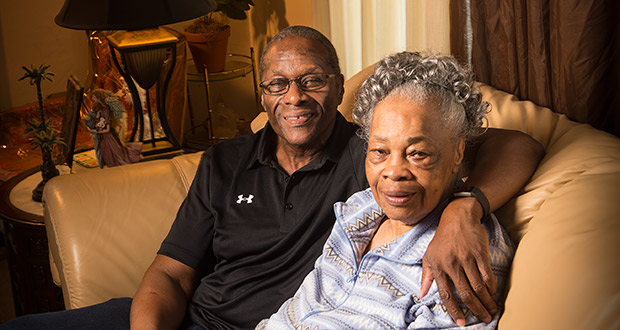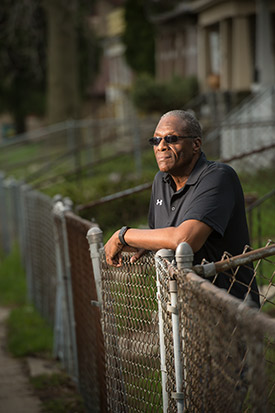Lawyer-regulation system leaves few options for clients unhappy with their legal representation
By: Erika Strebel, [email protected]//June 3, 2019//
Lawyer-regulation system leaves few options for clients unhappy with their legal representation
By: Erika Strebel, [email protected]//June 3, 2019//

Willie Armstrong has been searching for a lawyer to represent his mother for two years, ever since the one he hired dropped out of the case.
In December 2014, Armstrong met the Milwaukee-area attorney Tom Vaitys about representing his mother, Julia Dozier of Milwaukee, who was in a dispute with BMO Harris Bank over thousands of dollars that were missing from her bank accounts.
The previous year, Armstrong had noticed irregularities in Dozier’s checking account. Investigating them, Armstrong, who lives near St. Louis, concluded that Dozier’s personal banker at BMO Harris had taken about $6,000 out of it.
After filing a complaint with the bank and writing letters to executives there, Armstrong finally decide to hire a lawyer. His first meeting with Vaitys left him impressed.
“As her advocate, power of attorney and son, I did my best to find an attorney to represent her in a legal matter,” Armstrong said. “At the beginning, when I talked to this guy, he was gung-ho.”
But the enthusiasm didn’t last. After initially writing a demand letter and filing a lawsuit on the behalf of Armstrong’s mother, Vaitys failed to turn over documents and communications with BMO even though Armstrong had repeatedly asked for them. Later, he sought to have himself removed from the case.
Wisconsin’s lawyer-regulation system does offer some remedies to clients like Armstrong. But unlike victims of crimes, clients have no chapter in state statutes giving them specific rights.
When clients file a formal grievance, they can prompt the Office of Lawyer Regulation to open an investigation and possibly file charges. The OLR also will typically ask the Wisconsin Supreme Court to order a lawyer to pay restitution to a client or to obey a court order issued in a client’s case. In rare circumstances, the OLR will ask the justices to have a lawyer’s work monitored.
Gregg Herman, a Milwaukee lawyer whom the OLR retains from time to time to prosecute cases, noted that such requests are rare and always give rise to at least a couple of questions. For one, who will do the monitoring; and two, who will pay for it?
“We do try to consider the victim and get restitution when appropriate,” he said.
But the OLR neither represents clients nor monitors the outcomes of cases handled by lawyers who have been disciplined. Once the Wisconsin Supreme Court imposes disciplinary measures on a lawyer, that’s usually the end of the OLR’s role.

Although most grievances do not result in discipline, they do give an outlet to clients who are upset and have no one else to turn to.
Vaitys’ lawyer, Michael Torphy, said people often have unrealistic expectations about what lawyers can do.
“It’s probably from lawyers failing to accurately reflect what their expectations are,” Torphy said. “It might just be a function of business practice and whether we should pump out as many lawyers as we do.”
Outside the OLR, clients can sometimes choose to file a claim with the Wisconsin Lawyers’ Fund for Client Protection, which is financed by fees the high court charges lawyers who have been admitted to the state bar. However, the fund only covers situations when lawyers take money or property that had been entrusted to them, such as fees paid in advance or money that should have been kept in a trust account or trust fund.
Another way clients can obtain redress, one that Armstrong is considering, is to file a legal-malpractice claim and attempt to recover money from malpractice insurers.
As for Armstrong’s particular dispute, a judge did eventually order it to arbitration in March 2016. But, a few months later, the arbitration vendor working on the case, the American Arbitration Association, sent a letter rejecting the filing.
Armstrong said he didn’t get an email about the letter until September and said Vaitys, despite Armstrong’s repeated requests for the letter, did not send a copy of it until December 2016. What’s more, Armstrong says that letter was never shown to the court either by Vaitys or by BMO’s lawyer or mentioned in the last telephone hearing in the case.
Vaitys ended the representation shortly after the hearing and never returned Armstrong’s file.
Armstrong wasn’t the only one taken in by Vaitys. The lawyer also left a favorable impression on Tim Hansen, the owner of a Milwaukee salvage business. Hansen had hired Vaitys three years previously to represent him in a dispute with a truck-repair company that had damaged his company vehicle.
“I thought I had a good read on him at first,” Hansen said. “The documents he created for the retainer were professional. He filed right away.”
But Vaitys failed to show up at a motion hearing on September 2017, and the judge dismissed the case with prejudice, barring Hansen from ever bringing his claim again.
“No one will take the case,” said Hansen. “No one wants to work in muddy water.”
It turns out that Hansen and Armstrong weren’t alone.
The Office of Lawyer Regulation in June 2017 charged Vaitys with more than a dozen violations of state ethics rules, most of them involving his representation of one client in a Milwaukee County estate matter. According to the allegations, Vaitys failed to hold client money in trust and used that money for his own benefit, fabricated records to hide that he had misused money that was supposed to be held in trust and failed to file briefs in a timely manner to the state Court of Appeals.
In its complaint, the OLR had asked for a three-year suspension of Vaitys’ license and for Vaitys to pay more than $70,000 worth of restitution to his client.
In 2018, Vaitys filed a petition seeking voluntary revocation, saying he could not defend himself from the allegations in the OLR’s complaint as well as allegations from other OLR investigations.
One of those investigations was prompted by a grievance Armstrong filed against Vaitys in late 2017. The OLR eventually identified 16 possible ethics-rule violations.
The OLR supported Vaitys’ petition, and a referee in February recommended that the Wisconsin Supreme Court accept Vaitys’ request for revocation. Should his request be granted, his license would be suspended indefinitely, although he would be able to petition for reinstatement after five years through a process requiring a hearing and an investigation.
But revocation wouldn’t necessarily help Armstrong or Hansen.
Vaitys has shut down his law practice and moved to California, where he runs a family business. His lawyer in the case, Torphy, declined to comment specifically on Vaitys’ case.
Speaking in general, though, he said that lawyers often make errors in judgment, have ethical struggles and are faced with tough choices. Some are of these difficulties are of their own making and some are brought to them by clients – and others are simply part of the legal system.
“The biggest problem for lawyers is being overworked more than anything else,” Torphy said.
In both Armstrong’s and Hansen’s cases, it’s not clear whether Vaitys carried legal-malpractice insurance. Wisconsin, like most states, doesn’t require lawyers to carry malpractice insurance.
Armstrong and Hansen, for their parts, said their experience with Vaitys hasn’t deterred them from searching for another lawyer.
“I’m leery about attorneys, but I have to trust somebody,” Armstrong said.
Hansen has found a lawyer to help him file a grievance with the OLR against Vaitys and hopes that he can file a legal-malpractice claim to recover the $39,000 he had hoped to gain from his initial lawsuit.
Armstrong is also considering a legal-malpractice claim, but his priority is to find a lawyer to help him reopen his mother’s federal lawsuit and introduce the AAA’s 2016 letter rejecting his arbitration request. So far, he says he has only found lawyers willing to represent him in another arbitration – something he doesn’t want because the proceedings would not be public record.
“I’m going to continue keeping on because this is my mom and she deserves justice, and I’m going to get justice for her,” Armstrong said.
Legal News
- Some State Bar diversity participants walk away from program
- Wisconsin court issues arrest warrant ‘in error’ for Minocqua Brewing owner
- Iranian nationals charged cyber campaign targeting U.S. Companies
- Facing mostly white juries, are Milwaukee County defendants of color truly judged by their peers?
- Milwaukee Mayor speaks in D.C. Tuesday at White House water summit
- Chicago man sentenced to prison after being caught with ‘Trump Gun’
- FTC bans non-competes
- Gov. Evers seeks applicants for Dane County Circuit Court
- Milwaukee man charged in dismemberment death pleads not guilty
- Democratic-led states lead ban on the book ban
- UW Madison Professor: America’s child care crisis is holding back moms without college degrees
- History made in Trump New York trial opening statements
WLJ People
- Power 30 Personal Injury Attorneys – Russell Nicolet
- Power 30 Personal Injury Attorneys – Benjamin Nicolet
- Power 30 Personal Injury Attorneys – Dustin T. Woehl
- Power 30 Personal Injury Attorneys – Katherine Metzger
- Power 30 Personal Injury Attorneys – Joseph Ryan
- Power 30 Personal Injury Attorneys – James M. Ryan
- Power 30 Personal Injury Attorneys – Dana Wachs
- Power 30 Personal Injury Attorneys – Mark L. Thomsen
- Power 30 Personal Injury Attorneys – Matthew Lein
- Power 30 Personal Injury Attorneys – Jeffrey A. Pitman
- Power 30 Personal Injury Attorneys – William Pemberton
- Power 30 Personal Injury Attorneys – Howard S. Sicula











